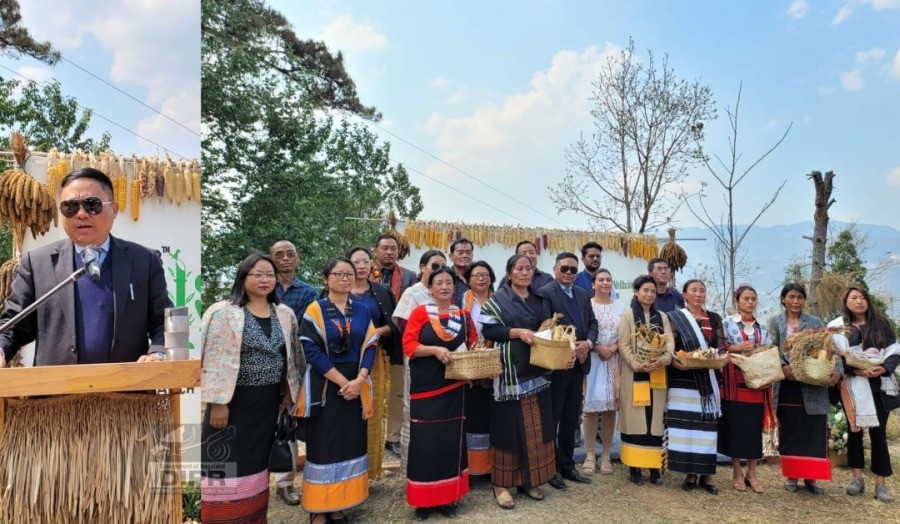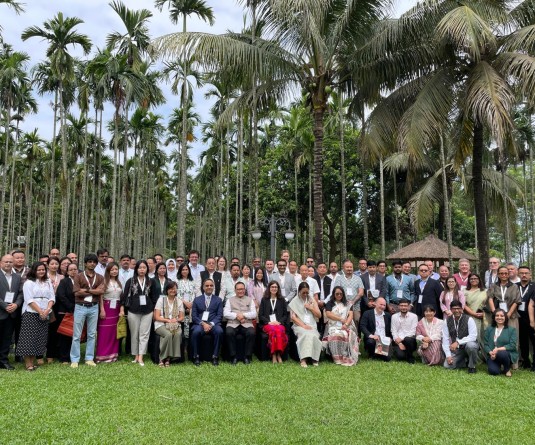APC Nagaland with women participants and others during the 13th Bio-Diversity Festival at NEN Resource Centre, Chizami, Phek on March 9. (DIPR Photo)

Phek, March 9 (MExN): The North East Network (NEN) organized the 13th Bio-Diversity Festival at NEN Resource Centre, Chizami, Phek with the theme ‘embracing biodiversity for well being’ on March 9 with Agriculture Production Commissioner (APC), Nagaland, Y Kikheto Sema IAS as the guest of honour.
According to a DIPR report, the APC informed that 2023 will be declared ‘Year of Millets’ and proposed applying for a G.I tag for indigenous food products like ‘Axone’, ‘Anishe’ and fine dried bamboo shoots.
The APC commented that the NE states have been able to retain a significant proportion of their biodiversity, possibly due to long years of isolation and the difficult terrain, but it is now under increasing pressure to unleash its resources for economic development. He said that any development process that “fails to put in place environmental safeguards may cause irreversible damage to the region.”
He stated that in Nagaland, there is increasing pressure on the forests for commercial exploitation to augment the income of the rural population, resulting in degradation of the forest resources and biodiversity. He added that Jhum cultivation, practiced by 73% of the total cultivation, is one of the reasons cited for the forest degradation and urged on the need for sustainable restoration and rejuvenation of Jhum area for restoration of forests and conservation of biodiversity in the state.
The APC proposed a proper road map for the State as well for each district and community, even involving Agri and Allied departments for proper demarcation of conservation and cultivation areas for balanced maintenance of biodiversity and combating climate change. He strongly advocated for the preservation of the top most portion of the forest, mountains to be kept as catchment areas and encouraged them to use local seeds instead of commercialized seeds.
Sema also appealed to various NGOs, FPOs, and FIGs to forgo applying for only Government subsidies and Grants and informed that a new Scheme called the Agriculture Infrastructure Fund (AIF) is in the pipeline focusing on Post Harvest Infrastructure where GoI will provide interest subvention loan through NABARD and Bank.
While appreciating the womenfolk, he remarked that Naga women play a very important role in farming, from planting to the selling of the produce in the markets, thereby transforming the socio-economy of the rural people. He stressed the importance of the role of women in the transformation of society, changing the mindset concerning ecological issues, and also improving the economy of the family.
Tamara Law Goswami delivered the keynote address where she highlighted how the human relationship with the environment is broken. She said the Pandemic has revealed how fragile human health is and women are the first to be impacted. She expressed gratitude to all the stakeholders, especially for the overwhelming response from the Government led by APC and Agri and Allied Departments and the local Farmers from all over Nagaland for attending this event.
Heritage Seed Exchange
The main highlight of the programme was the Heritage Seed Exchange which took place between women farmers of different villages from Nagaland.
The programme was followed by an interactive session with the stakeholders where the APC briefed the participants that the Government of Nagaland will support the initiatives of preservation and promotion of traditional seeds by helping to buy the products and also requested the stakeholders to explore and facilitate the activity of skill and knowledge exchange with regards to best practices and improved techniques.






